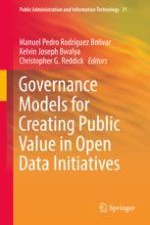This book relies on the conceptual model of Open Government (OG), focusing on transparency and, concretely, in open data initiatives at the local government context with the aim of improving participation and collaboration. Most Open Government models are centered on three pillars: transparency, participation and collaboration. Transparency is a crucial ingredient of OG and, applied to data openness means to ensure that the data are well known, comprehensible, easily accessible and open to all. new governance models based on different open data models have not been proposed up to now. The chapter authors seek to contribute recent research to the discussion on governance models of open data initiatives to support Open Governments with the aim of creating public value. It includes both theoretical and empirical studies on governments models in open data initiatives.
